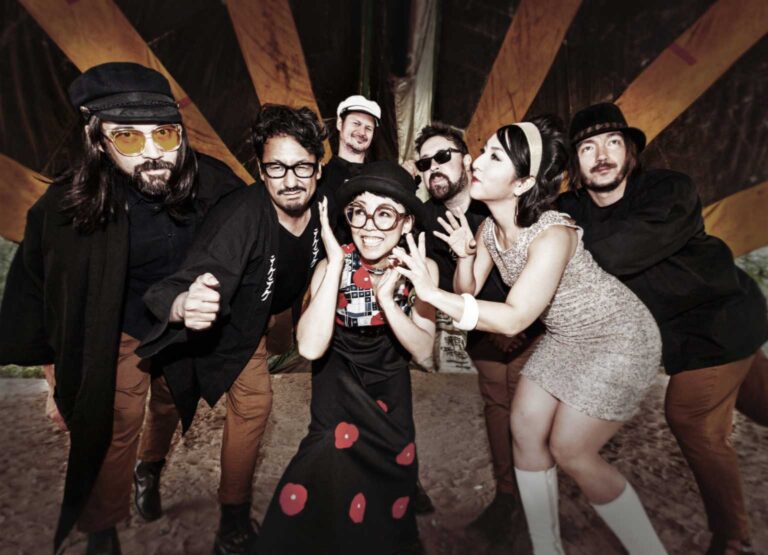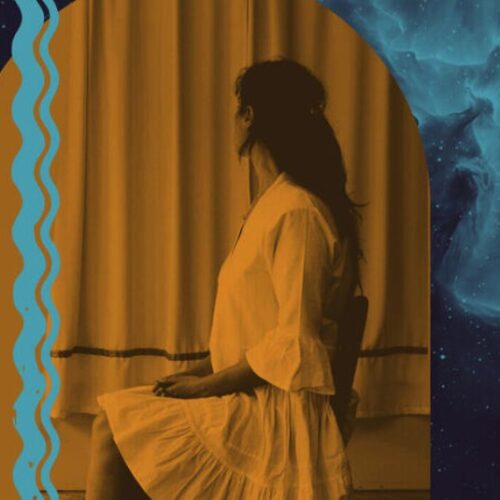Additional Information
The seven-headed cross-cultural art-rock hydra are set to take the stage at Club Soda at 9 PM. I sat down with Serge, Maya, Etienne, and Yuki at their rehearsal to discuss their music and what is sure to be an epic performance.
PAN M 360: What an honour, thanks so much for having me here. How are the preparations going?
Etienne: Good! We’ve done some rehearsing today, and we got to break in the set at the Ottawa Jazz Festival last week. But this is a bit more pressure because it’s Montreal, you know, hometown.
Serge: Yeah it’s been going well, and the Ottawa show was good testing grounds for the material. Here in Montreal, the venue, Club Soda, is kind of a big place, so we’re hoping we get some people in. We’ve opened there before, and it’s definitely kind of exciting to be headlining there.
PAN M 360: And now you’ll have the Ghost Funk Orchestra opening for you?
Serge: That’s right. They’re from Brooklyn, but we met them in upstate New York, and had the chance to see them play. And when we saw them we were like, oh there’s trombone, there’s flute. It was like they were our doppelgänger band.
Etienne: But it’s different musically. They play more kind of funky, more like soul. We know they’re going to really warm up the crowd for us.
PAN M 360: I have to admit, I have yet to see you all in action but I know, from reading youtube comments really, that when you play you bring a tremendous amount of energy, especially you Maya.
Maya: It’s funny you say that, because it’s actually after the show that I feel I have the most energy. A lot of energy…I can’t sleep. After each show, I feel alive, I feel young again. So if I keep playing, I will keep getting younger! But it can be difficult touring, playing like that, every night.
Etienne: Especially for the voice, you know, it’s even harder than all of us, I think.
Maya: But me, I don’t drink alcohol at all. I don’t smoke. That’s a big plus.
Serge: And sleep is always the key.
Etienne: I do the smoking for her.
Yuki: Ha, and the drinking.
PAN M 360: There’s a lot of theatricality in your performances too Maya. Do you have a background in theatre, or are you inspired by Noh or something like that?
Maya: Actually I was doing theatre in Japan. And when I was in theatre university I got to know like a comedy version of Noh, called Kyogen. But Noh, my goodness, is very high, very traditional. Kyogen is like a light version between the Noh acts, but still a lot of concentration and intensity, and I love that, but I can’t say I was doing it. I love Butoh. Butoh is this dance movement that came about in the 70s. It was sort of a reaction to the traditional beauty of dance. It was more raw, they show like more of the body, of existence, of flesh, of blood, of soil. It’s more real.
PAN M 360: Wow, I can definitely see traces of that in your music. It’s so visceral. I remember watching a CBC interview with the band and one of the questions asked about your process as a band. You said you were heading to an izakaya to talk about it. Did you ever figure it out?
Serge: Yeah, big question. I know we went to the izakaya that night, but I don’t know if we talked about it, ha. But it’s something we talk about often. Well we have to because we’re seven people and so it’s a process that’s kind of crazy and always changing. I found with Hagata, we had more studio-time, and we went in the studio with the songs that were a bit less prepared.
And it was also that we had like two blocks of five days to record. And in between we had like a tour in Europe for three weeks, so we tried a lot of stuff there. We rented some spaces to work on the new stuff, basically for the second session.
Etienne: During that tour, yeah, we worked a lot.
Serge: We kind of had to because we booked the studio for those two sessions, one in June, one in August, and we just set our goal, we have to finish all our songs and that’s it. Also working with that producer, Daniel Schlett, was a big part of the process, and he was basically another member of the band.
PAN M 360: Well, necessity is the mother of invention. The logistics of a seven-piece must be hard to work with though, even just getting everyone together I imagine, but your sound is totally worth it.
Etienne: Sure but everybody is willing, and everybody is mature enough to understand what it is to be involved in this sort of project, all the time that needs to be invested.
Serge: That’s because we’re all in our late 30s and not in our early 20s anymore. So this is what we do, and this is what we love to do.
PAN M 360: TEKE::TEKE is such an original and frankly awesome group. We’d love the definitive origin story for the band.
Serge: Basically it was Etienne and I who came up with the idea. We were touring with Boogat, a rapper, and we were just hired guns on the gig. Ian, the drummer, was playing with us too. It was during a tour on the West Coast that we started listening to Takeshi Terauchi a lot, mostly in our van.
Etienne: Up and down Sunset Boulevard.
Serge: Yeah, yeah. It was the first time in my life that a guitarist really caught my attention.Like I do play the guitar, but I’m not really a guitarist you know, I play drums, I play a bit of everything maybe, I’m more interested in ideas and concepts than like learning my instrument, but when I heard his playing I wanted to learn how to play like that. Eventually we just thought it’d be nice to put together a little tribute band.
And that’s how it started. We played our first show in May of 2017 at the Distortion Psych Fest. And it was just instrumental covers. Maya was there, she had come to see the show, but the way we played his music was different. We weren’t trying to imitate his tone and everything. I learned a bit of his playing style, but, you know, we took certain liberties, we added the trombone and flute, and his music is mostly written for three guitars. So the sound that came out of that first show was like a kind of revelation to us, and I thought to myself it’d be nice to do more of that.
From there we kind of expanded the repertoire, to more Japanese music from the 60s and 70s and that’s when Maya joined in for a few songs, and then we started thinking about writing our own music as soon as we felt we had something there. We recorded our first EP, it has two covers on one side, and two originals on the other side, and then we went and recorded the first full-length album, which was in 2019.
PAN M 360: And you’ve been making waves since! Do you feel you have something of a fan base? The landscape has changed so much and it’s nice to see the band going strong.
Serge: Yeah, well a couple of days ago Maya and I played a DJ set as part of the festival. It was nice to see people come through to say hi and be with us, you know. So hopefully we’ll see a lot of them at the show.
Etienne: We seem to have some people listening to us everywhere. Whenever we tour, we seem to fill out the halls, and people will always love live music no matter what.
PAN M 360: Well I think part of the reason is that you have something really unique, and really good to offer. But I wonder, Japanese culture especially tends to be exoticised, do you feel like the music can be seen as a gimmick because of it?
Serge: Well perhaps in the beginning we might have felt like that, but after two albums you know it’s the real deal, and we have something real to say. At the same time I feel like there is something in our music that is actually familiar, at least to people here in Quebec. As someone who grew up here, we got a lot of anime from Japan that were translated to French, and the music, the soundtracks, it really stayed with me and people of my generation. There’s something nostalgic there.
Maya: And as for the lyrics, I can’t write poetry in English or French, so I do it in Japanese. I hope people will understand the meaning, so we try to have the translations on the website and the videos, but it’s only because of that I sing in Japanese. But at the same time, when I was in Japan, I listened to a lot of music in English and I didn’t understand much, but I liked the music and I listened. Also, when I went to London a long time ago, when I was young, I went to see the theatre, I couldn’t understand anything in what they said, but I really felt the feeling.
PAN M 360: Well I have to say I didn’t understand much with your music, but I absolutely felt it. Any plans for what’s next?
Serge: Well yes, but we actually can’t talk about it. But there is a kind of a big project. Very similar to an album, but different…
PAN M 360: That’s terribly suspenseful, but I can’t wait. Really looking forward to the show, have an absolute blast.























